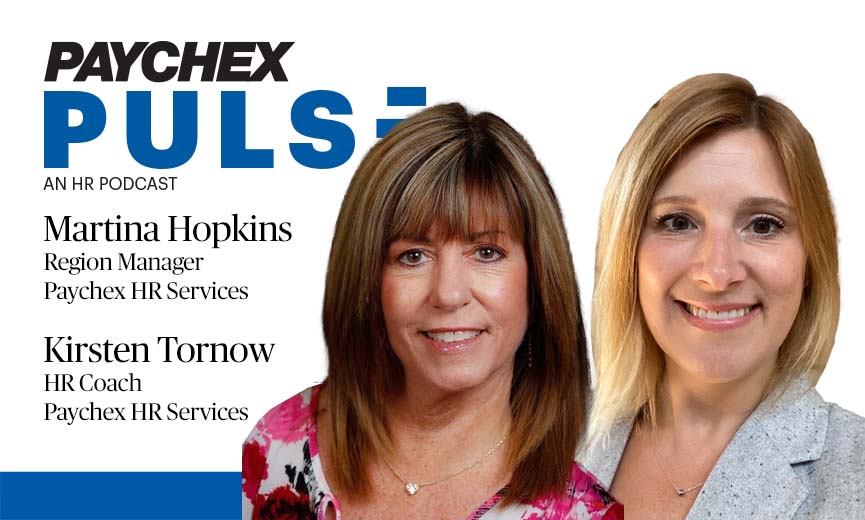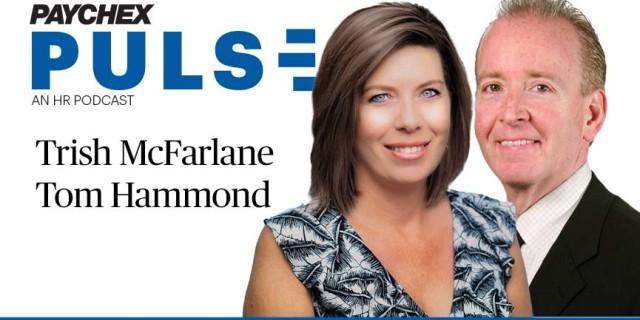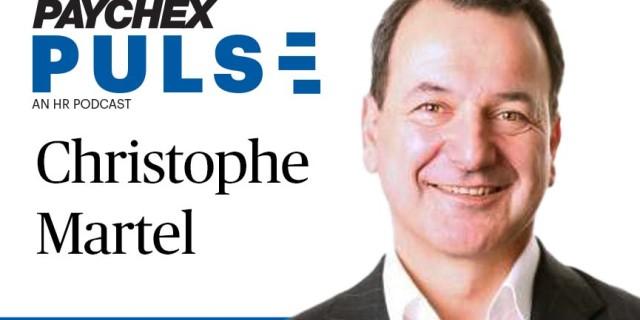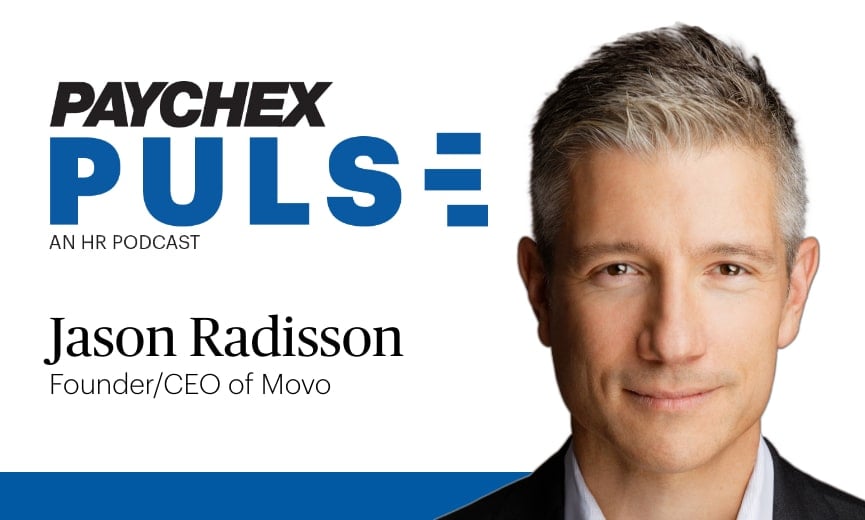All Ages Welcome: Optimizing the Multi-Generational Workplace

Podcast •

Watch
Summary
Taking the time to understand generational differences could yield many benefits for your workplace. On this episode of Paychex PULSE, discover how you can leverage the strengths of each generation to find and keep top talent, optimize your hiring and onboarding process, and foster an inclusive workplace culture.
Topics include:
00:00 – Welcome Martina Hopkins and Kirsten Tornow
01:04 – Generational overview
02:54 – Retention tactics by generation
04:30 – Opportunities for mentorship
06:36 – The role of training and career development
09:34 – Offering benefits to meet multi-generational needs
12:05 – Overcoming biases
14:58 – Multi-generational workplace success stories
17:56 – Wrap up
Learn more about managing multiple generations with this guide.
Watch our webinar about bridging generational gaps for even more insights.
The onboarding process is key to engaging employees of all ages. See how you can improve yours here.
Find out how Paychex HR Services can help meet the needs of your multi-generational workplace.
View Transcript
Rob Parsons (00:03)
Welcome to Season 4 of Paychex PULSE, an HR podcast where HR professionals can find great insights on today's top issues and be inspired to build and lead effective teams in a healthier workplace.
Rob Parsons (00:19)
Hi, everyone. Rob Parsons here. Welcome back to the Paychex PULSE Podcast. Today we're going be talking about generational differences in the workplace. Joining me are Martina Hopkins and Kirsten Tornow. Martina is a regional manager for Paychex's Professional Employer Organization, or PEO, leading a team of 100+ HR professionals who service over 5,000 clients in the Eastern region of the United States. Kirsten is an HR services coach. She's worked in human resources for 20 years, spending much of that time providing HR consulting to small and mid-sized businesses. Martina, Kirsten, welcome to the podcast. So great to have you back here. And the generational issue is always such a great topic, especially with Gen Z really starting to make an impact in the workplace. So now we've got them, got Millennials, Gen X, Baby Boomers. We've got them all to work with. Can you sketch out for me some very high-level background about each generation, understanding, of course, that every individual is different?
Martina Hopkins (01:27)
Yeah, absolutely. First, I think the most important thing is for employers to realize that job seekers have many, many options. So, be competitive and also be selective about your hiring choices, right? So, the Baby Boomers are traditional candidates out there and they'll more than likely look forward to an in-person interview. What they're looking for also is flexibility in work schedules because they want to be able to attend grandchildren events and probably do some traveling for longer weekends, right? Their healthcare is very, very important to them, as well as their retirement. So those are things to consider when you're attracting. So, the Gen X, they're raising their families, so they too are very interested in healthcare options and spending time with their family. They want care... They want the flexible work environment as well. And as far as benefits, they're looking for 401 , tuition reimbursement. Those would be things that would be important to them. Millennials are expecting to be an online recruitment experience, right? It's a place that they're comfortable with and they will look to navigate the entire experience, if possible, online, or remotely. They want career advancements to be clear and pathing so that they understand how they can grow with your organization. For the Gen Zs, they grow up on social media so be sure to prepare a strong presence out in the social platforms. What they're looking for is prioritizing salaries over benefits. So not quite the same as the other generations that we spoke of.
Rob Parsons (03:08)
That's great. That's a nice high-level overview there, Martina. When it comes to retaining these people, like we can find them and we can keep them, when it comes to keeping them, what are you seeing different, for instance, between a Baby Boomer and a Gen Z? What's going make them stay? What's going to make them move on?
Kirsten Tornow (03:28)
Yep. So, I think as we're talking about retention, some of the things that Martina had mentioned that really attracts and retains those workers. Things like the flexible work schedule arrangement. When we have Generation X and also Millennials, some of the older Millennials have younger families. So, flexibility around that. Maybe some onsite daycare options. Really that technology, work from home option, work from home flexibility and some of those remote scheduling really helps in those areas. As well as Generation Z, who Martina had mentioned really grew up on social media, right? And so having that workplace, having those digital platforms, self-service aspects to get in, see your paycheck, log your time, doing all of that through the computer really helps. And I think that also comes as we're talking about hiring and onboarding, attracting the different generations from that aspect, one, with technology platforms, but also considering the differences, right? Maybe looking at some more paper or going away from paper with some of the younger workforce. So, a lot of things to consider.
Rob Parsons (04:47)
I was going to touch on that because I know I have a daughter who's Gen Z all the way and her expectations for work are completely different, even her understanding. And she feels very much more comfortable with a digital experience where it's all laid out. It feels very much like everything that she does. I'm on the other side. I'm a manager and I am still... I find myself still adjusting to some of these new digital platforms that we're using to get people onboarded and get your I-9s done and just all the work that has to be done. So how does an HR manager navigate these different generations, different technologies? Because we're trying to be more efficient, we're trying to be better there, but we also have to please many people.
Martina Hopkins (05:32)
Yeah, so I think what's important and what I like about this subject is that really leverage into the folks that you have, right? Because we wouldn't want to say that folks over, let's say, 45 or 50 are not comfortable with the online experience. But what you can do is you can say that perhaps someone in their 20s is and match the two, right? For mentoring opportunities, for skill enhancements. And maybe an old paradigm was the more tenured person was teaching the newest person in the organization. That script has flipped on us. The newer, younger generation is coming into the workforce watching something that I might be doing, and saying, 'Oh, I have so much of a better way to do that.' And when you allow for that type of connection and facilitate it through your trainings, through your orientations and your onboarding, you're actually building a culture that melts away at the generation and really creates a more cohesive work environment.
Rob Parsons (06:36)
I love that idea of inclusion. I like how you talked about mentoring and training, skills development. I don't know if this is true, but I've heard that Gen Z is craving, absolutely craving soft skill development. It's this idea of professionalism, of persuasion, of influence when you don't have authority. The kinds of things that maybe back in my day you had time to learn as you climbed a corporate ladder very slowly and over time, and they're looking to move ahead quicker. Can you talk a little bit about what the role that learning and development plays and helping different generations achieve their different goals?
Martina Hopkins (07:14)
I don't think it's really generational so much. If you think about when we were all, whatever generation we're from, what went into the workplace, we wanted talk tracks, right? We wanted to know. We wanted to be trained how to answer the phone, how to close out a conversation, how to summarize a conversation. So, it's not unusual to me at least that the Gen Zs are feeling the same thing. It's just that we've gone past that foundational learning, if you will, and we've been practicing it perhaps 10, 20, or 30 years in the workforce. So, I think it's going back to remembering what we needed in the beginning and then making sure again that we leverage that in our learning materials. Not everyone wants to go through a full path of online learning, even if they're a Gen Z. They want an opportunity to have some facilitation and have a cohort where they're talking to their new hire person, their peer that's new hire, and finding out did you gather from that information what I gathered from it? Let me play it back for you what I think I heard. Kirsten, what would you say?
Kirsten Tornow (08:20)
Yeah, and I like... As you were talking I was thinking about the option to kind of pick and choose the training. So, having a learning and development program where you have a lot of offerings dependent on the skillset, where they're coming in, and really meet them where they're at, right? And I think having the importance of a mentor to be able to help identify that and help them along the way is really helpful. A lot of the things that have been in the workforce for quite some time take for granted, right? Those soft skills that you had mentioned, how to answer the phone, how to reply to an email, how to maybe word tracks, right? When do they need that information? Do they need it right away? Or let's learn the job and then let's work on some of those soft skills and put together a plan. Because when we're talking about onboarding, it's not just an orientation meeting. It should be really just moving along with that individual really over that first year or even longer. Checking in with them, making sure they're getting what they're needing and then tailoring it to different communication styles, different learning styles, different generational aspects.
Rob Parsons (09:34)
I love that idea of personalization. I want to go back to Martina, where you started. And, Kirsten, you can jump in on this one too if you'd like. We talked about personalizing learning development. You touched on all these different benefits, and it's not my father's Oldsmobile. Our benefits packages have very much evolved. Employers are being a lot more creative, a lot more thoughtful, but it's also not one-size-fits-all. So how do I get a feeling, how do I figure out what's the right mix to offer my employees when I've got this wide range and I can't do everything, and I can't be everything to everybody? How do I craft a benefits package, and maybe learning's part of that, that matches up with my actual employees?
Martina Hopkins (10:24)
Well, it's not as hard as you think it is. I would say be brave and have an employee survey about it. When we survey employees, it doesn't mean we're going to open up the checkbook and do everything that they're inquiring about, right? We want to be able to weigh in. Is pet insurance really important for your demographics? And in many parts of the country, pets became super important in our lives, so we want to make sure that we're matching that need, right? You mentioned training, also tuition reimbursement, those types of things will be very important if you're in a college town. That's going to be one of the higher demands because that's just the culture that they're used to. So, I think asking those questions, teeing it up in an employee survey, evaluating the survey, and then what we know most about surveys is always present out the results of the survey. And even if you're not, again, going to implement nine or 10 different benefits, make sure that the employees know that you pulled in their information and value their feedback. And now this is how you're going to select perhaps maybe two or three additional benefits. Also, a lot of benefits are not employer carried costs. They can actually be elected by the employees and paid fully by the employees. So, it's a good thing to find out what really rings the bell and resonates for your employees.
Rob Parsons (11:48)
I love that note, Martina, about taking it back out to the employees and recognizing that you've been heard. I think that we've all taken surveys where it felt like it just went into a black hole and there was no responsiveness at all. And it's like, eh, am I just wasting my time here?
Martina Hopkins (12:04)
Right.
Rob Parsons (12:05)
Something else I wanted to touch on. And it plays a little bit into that inclusive component where there is conscious or unconscious, bias. Younger to older, older to younger, maybe some prejudices that we're all just bringing to the party that we're not even thinking about. And I could see that really impeding some of these efforts to build a team that's really multi-generational. Can you talk a little bit about how I can overcome some of those biases in my managers and in my leaders and making it work better?
Kirsten Tornow (12:40)
I think one of the important things is training. So, when you have really selected your candidates that you want to bring in for an interview, get your interview team together and make sure that they understand interviewing techniques, that they understand what they should ask, what they shouldn't ask. Questions like rather than what year did you graduate college, tell me about your work experience. Have it been more open-ended rather than focusing on dates. We certainly have a lot of questions we shouldn't ask, but really asking those open-ended questions, making sure your interviewing team has that in their back pocket and we can help with that, right? So, working through some of the trainings, interviewing techniques, dos and don'ts of recruitment, you can lean on other people to help with that.
Rob Parsons (13:37)
I love that thought and that's certainly something, and, Martina, I'll let you talk about this a little bit. There are external resources I can go to. I don't have to go it alone. I don't have to guess. Can you talk a little bit about the places people can go to get a little bit of expertise, a little helping hand when they need it?
Martina Hopkins (13:56)
Absolutely. So, you mentioned in my bio that I have a team of over 100 HR professionals. They are fabulous. So, one thing you can consider is working with Paychex. We have many different sizes and shapes of services that we can offer you in addition to payroll, taxes, retirement plans, insurance plans that we touched on, and also HR guidance. So, folks are able to reach out on a regular basis and work with their dedicated HR professional to address some of these items. And also, to hear what's new in legislations, whether that be at the U.S. level or down to city and state level. So really partnering with someone. We talk about learning, right? We have a full suite of online learnings, and we also will customize leadership learnings for your management team.
Rob Parsons (14:58)
Love it. So, I've got an interview question for you both right now. So, if I'll give you a minute to think on it. Can you tell me a success story that you or one of your team members have had when it came to really helping a company optimize how they're handling different generations? Or what they're doing, either to bring on a more youthful workforce and really get them engaged and productive right away, or to keep older members of the workforce or in my case, more seasoned, keep them firing on all cylinders and really making a difference. Do you have any stories in mind you can share?
Martina Hopkins (15:35)
I do have one, one that I'm very proud of. So, one of my HR professionals in the South Florida market, their client is in construction and it's a family-owned business. And they were given a contract to open up one of the Amazon huge facilities. And so, they were going to grow by about 100 work site employees. And when their HR professional heard about this, she was very excited for them. And she posed one question to them, which was going back to Kirsten's point, how will your leaders be able to ensure that they're interviewing consistently across and bringing in the right talent? So, we put together a program for them just to help them bridge that period of time where it was going to be mass hiring and making sure that they were being consistent, understanding questions they're not allowed to ask, but also bringing in the best talent for their organization.
Rob Parsons (16:28)
That's great. Kirsten, do you have one for me?
Kirsten Tornow (16:31)
Yeah, yeah, I do. So, a couple years ago when I was an HR Business Partner, I had clients of my own prior to being an HR coach. I had a client. They were in Colorado, and they were growing very rapidly. So similar story, right? To what Martina had told. They were growing rapidly but they also had an issue with retention. So, they had a lot of employees who were leaving. And so, one of the things we looked at and that I had discussed with them was really looking at their benefits packages. They weren't offering PTO. They weren't offering any other fringe benefits other than health insurance, which certainly is important. So, we came up with just some options. So really just kind of looking at the full strategy of what are they offering, what's their whole hiring process, put together some benefit packets for them, some fringe benefit plans, PTO, sick time, all that good stuff. Talked through some flexible work arrangements. And it really helped, it helped on that aspect, and then also just getting people in the door. And so, the full onboarding program I mentioned before, not just orientation, right? But just identifying mentors and getting new employees in the door and having them have a good experience, right? Because they're starting a new job, that's also scary. So, we want to make sure that they have a good experience too.
Rob Parsons (17:56)
That's fantastic. Thank you both so much for joining the podcast today. This was a lot of great information.
Martina Hopkins and Kirsten Tornow (18:04)
Absolutely. Thank you.
Rob Parsons (18:06)
And I look very much forward to our webinar on this topic, and we'll have some more time to dig into these areas in more detail and that'll be a lot of fun. Thank you to our listeners for joining. As always, please stay happy and healthy.
Rob Parsons (18:19)
Be sure to subscribe to this and our Paychex THRIVE Business Podcast on your favorite podcast platform. Looking for more ways to keep your finger on the pulse of industry dynamics? Visit our resource center for the latest research, thought leadership, and news at Paychex.com/worx. That's W-O-R-X. Thanks again for joining us. Until next time, please stay happy and healthy.
Announcer (18:46)
This podcast is property of Paychex, Incorporated 2023. All rights reserved.

 Apple Podcast
Apple Podcast Spotify
Spotify iHeartRadio
iHeartRadio









